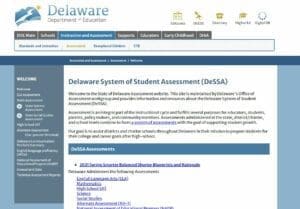

The Department of Education offers a landing page of information and links to help parents understand their child’s testing scores.
If you are a parent of a school-aged child and worried about your child’s test results, make an appointment with your principal to discuss them.
Don’t contact the child’s teacher or school counselor, said Theresa Bennett, director of the Delaware Department of Education’s Office of Assessment.
“Each school is different in how they handle you know parent concerns,” she said. “Sometimes the principal wants to have that conversation, depending, I think, on what grade the students are in. I know when I’ve had a concern with my own child, I’ve talked to the principal first and the principal then had a meeting with some of the teachers and the principal so we could all have a conversation.”
Parents likely have been receiving reports in the mail about their children in the last week or two, with different subjects — language arts, math and science — arriving on different days, along with material about how to learn more about the results.
RELATED STORY: School test scores dismal again, despite new math, reading programs
This is the last year parents will receive the information in the mail, Bennett said.
Next year parents will be asked to go online to see the results, which will enable them to see scores more quickly instead of having to wait until the end of the summer.
“We’re one of the last states that are still sending them home. We were told we’re behind the times by our own parents because they use home access and they have for years,” Bennett said. “Students don’t get printed report cards any more. They go on home access and get the report. So we’re trying to get with the times, per se.”
The Department of Education on Tuesday released aggregate state testing results, which were mostly dismal.
Testing info
State officials stress that standardized testing is only one measure of a student’s success. Other measures include grades in school, mastery of class assignments and district assessments.
The standardized scores can be an indicator of a child’s readiness for the next grade.
The Smarter Balanced tests are given to the third through the eighth grade at the end of their school year.
“As a parent myself when I see the score, I already know what’s geen going on during the school year,” she said. “So it really should be a validation of what they’ve seen happening throughout the school year for their child. But if it’s not, it gives parents a leaping-off point to have a deeper conversation with their school.”
The reports sent to student homes include a lot of information about the tests, but parents who want more can head to the Delaware Department of Education’s landing page for links that discuss more about the tests, what material is tested and what scores mean.
“Right on the front page, it explains the knowledge and skills that are assessed,” Bennett said. “It tells the key features of the assessment itself, and then when they open it up, they have the barrel chart that shows the performance level is and where their child’s score is within those four performance levels.”
The home reports also list recommendations for things parents can do, additional resources and links.


The Delaware Department of Educaition offers several ways for parents to get more information about their childrens’ standardized testing scores.
For those who want more, the Department of Education offers a landing page and a section of resources on Digital DE.
At first blush, both seem a jumble of topics and links that seem impenetrable, but clicking around on them can get parents to where they want to be.
The Digital DE Assessment Resources for Families tab includes information about reports, samples of what was on the tests, fact sheets and more.
Supporting Students at Home includes a lot of links to various organizations offering information about how parents can help a child learn.
Community Resources includes links to organizations such as the Parents Information Center of Delaware.
Bennett also steers parents who want to learn more about testing to their vendor website. It requires users to add an extension on their browser to safely navigate its resources.


Betsy Price is a Wilmington freelance writer who has 40 years of experience.
Share this Post









